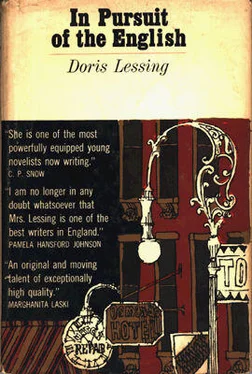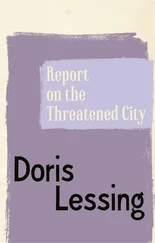At nine Miss Privet arrived, wearing slacks and a sweater and without make-up. The first thing she said was: ‘I see your friend has gone out to avoid the contagion.’
‘She’s just gone to the pictures.’
‘Yes?’ she said, in exactly the way Rose did. Then she shrugged and said: ‘But I’m glad of a bit of company, I’m getting the pip up there in that box.’
‘I was there for a bit myself.’
‘Your kid, too? How much?’
I told her, and she put her head back and laughed. ‘Yes, we have to pay for our sins,’ she said. ‘I’m paying that old tart downstairs four quid a week.’
‘You’re mad,’ I said.
‘Is that so?’ she said. ‘And why did you pay? If you’ve got a kid, or you’re on the wrong side of the Law you’ve got to pay. But I’m not staying. That old floozie downstairs’ll see my back before the week’s out.’
‘You don’t seem to like Flo.’
‘She’s sex-mad,’ said Miss Privet. ‘Makes me sick.’
‘She told me you were French.’
Miss Privet got out of the big chair, and hippily walked about the room, saying in a throaty voice: ‘Cheri, I love you, le t’aime. Ça va? Ah, cheri, cheri, come — for — a little — walk avec moi …’
She sat down again and said briskly, in her normal voice, which was Midland-bred, as far as I could judge: ‘I know enough catch-phrases and put on an accent to spice it up for those who haven’t met any French. I knew a French girl once. But she had to pretend to be English when she went back to Lyons. Give the poor fools what they want, that’s my motto.’
She never spoke of men in anything but tones of amiable contempt.
That evening we discussed literature. Her tastes were decided. She liked Priestley. Dickens, and Defoe, particularly the Journal of the Plague Year , which she knew practically by heart. ‘And do you know that man called Pepys? He knew his London. I often read a bit of his Diary and then walk over the streets he walked and think about things. Nothing’s changed much, has it?’
At that time I still had not learned to like London. I said so and she nodded and said it took time. But if I liked, she would show me things. Later she ran upstairs and fetched down a print of Monet’s ‘Charing Cross Bridge’. ‘That’s London,’ she said. ‘But you have to learn to look.’
Before she went to bed, she said that if the light was right tomorrow she’d take me to her favourite place in London.
Rose did not come to say good night to me that evening.
Next evening, about five. Miss Privet came down to say: ‘Quick, get a coat on. I’ll take you now.’ She had already turned to go and get her things, when she gave me a shrewd glance and said: ‘What’s the matter, afraid I’ll be in my warpaint?’
She came down wearing a straight cloth coat, flat shoes, and a scarf over her head. She saw me examining her, and smiled. Then she posed; and let her face assume a look of heavy-lided, sceptical, good-natured sensuality. This she held a few seconds; then switched it off, saying with contempt: ‘Easy, isn’t it? That and the shoes.’
We took a bus to Trafalgar Square, and at six, with the bells rolling from St Martin’s, she grabbed my arm and raced me up the steps of the National Gallery.
‘Now,’ she said.
It was a wet evening, with a soft glistening light falling through a low golden sky. Dusk was gathering along walls, behind pillars and balustrades. The starlings squealed overhead. The buildings along Pall Mall seemed to float, reflecting soft blues and greens on to a wet and shining pavement. The fat buses, their scarlet softened, their hardness dissolved in mist, came rolling gently along beneath us, disembarking a race of creatures clad in light, with burnished hair and glittering clothes. It was a city of light I stood in, a city of bright phantoms. But Miss Privet was not one to harbour her pleasures beyond reasonable expectation. For ten minutes I was allowed to stand there, while the light changed and the thin clouds overhead sifted a soft, drenching golden atmosphere.
Then she said. ‘Now we should go. It’ll be dead in a minute, just streets.’
Unfortunately I did not go out again with her, for she left.
Her history, or rather, what she told me, was this: She was the daughter of a lawyer’s clerk from the Midlands. She worked as a shorthand-typist until the war began, when she married a pilot who was killed over Germany. Then she was lonely and had a number of affairs. She was sharing a flat with a girl-friend. This friend married and Miss Privet found herself alone with three months’ instalments due on the furniture. Coming home one evening from work, thinking about the money she owed, she was accosted by a CI, and took him home on an impulse. He gave her the equivalent of ten pounds. For a few weeks she worked in her office as usual, and walked home afterwards, slowly — ‘practising the walk and the look’. Then she gave up her work in the office.
She became friends with one of her clients who was a businessman, married. For a while she was his mistress. But he had other friends. For three years, she had been kept by four of them. They all liked racing, drinking and gambling. They used to go to the races together, all five of them.
One evening, she was walking home by herself, thinking as she put it, ‘of my own affairs, but I must have been sending out the allure out of sheer force of habit’ when she was accosted by an American. She took him home and was discovered by one of her regulars, who told the others. The four of them made a mass scene, in her flat, where they had complained she was nothing but a common whore and a tart. ‘Which they might have thought of before, mightn’t they? Bloody hypocrites they are,’ she said. So she told them to go to hell and went back to the streets.
Then she got sick, neglected it, and found herself in hospital with pneumonia. Out of hospital, she went back to her flat and discovered someone had informed on her, and she had been dispossessed. She managed to rescue some of her furniture which was in store. Now she was looking for another flat. She had had a letter from one of the four businessmen whose wife had died. ‘He’s offering me holy matrimony,’ she said, with a wink.
‘Are you going to marry him?’
‘We-ell, I don’t think he should many a common tart and prostitute, do you?’ she drawled.
‘Do you want to be married?’
‘The way I look at it is this. You get bored with one man, don’t you? You get just as bored with four. So you might as well settle for one. The trouble is, he’s not the one I like the best. That’s life, isn’t it? If the one I liked ditched his wife. I’d think about it. As it is. I think I’ll just get myself a flat, issue an invitation or two, and see what happens.’
I said: ‘Aren’t you afraid of getting old?’
‘Don’t be silly,’ she said. ‘You’re really green, in some ways, aren’t you? Men don’t come to me for my looks. I’m not ugly, but I’m no oil-painting either. They come because I can cook. I can make a place comfortable, and I know what they like in bed. I’m not interested in sex. Any fool can learn to bite a man’s ear and moan like a high wind.’
‘Don’t you ever like sex?’ I enquired.
‘If you’re going to talk dirty, I’m not interested,’ she said. ‘I can’t stand dirty talk. Never could. I like you,’ she said, ‘but there’s things I can’t stand, and one’s sex-talk.’
Before she left, she made a formal visit, to say with the deliberate casualness that means someone has been planning a conversation: ‘Do you imagine you’re going to make a living out of writing?’
‘It’s a matter of luck.’
‘You don’t want to trust to luck. It’s a dreary existence, banging away all day, having to think up thoughts all the time. I’ve been thinking about you. Now listen. You’ll never have security. Now in my job you’ve got security if you’ve got a flat. It’s the only job that has real security for a woman. You can always be thrown out of a job. And take you — a spot of bad luck with your writing and where will you be — in some double bed you don’t like, I bet. Now you take my advice and get yourself a flat and set yourself up. Learn to cook. That’s the thing.’
Читать дальше
Конец ознакомительного отрывка
Купить книгу












